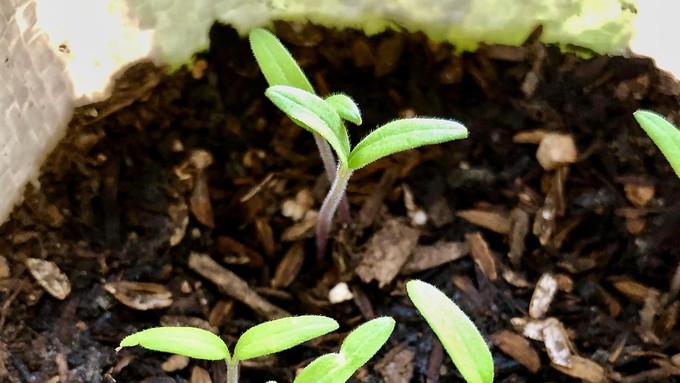
El Dorado County master gardeners offer free workshop

Tiny seeds quickly become tiny plants -- which become vegetables (in this case tomatoes) before you know it! Learn the best practices for seed-starting in Saturday's class. Kathy Morrison
Growing vegetables and flowers from seed is the most economical way to produce food and blooms as well as add new plant varieties to your garden. But how do you get started?
Learn tips from experts during “Starting Plants from Seed,” a free workshop offered by the UCCE master gardeners of El Dorado County.
Set for 9 a.m. Saturday, March 30, this three-hour class was originally scheduled for earlier in March but had to be postponed.
The class will cover the basics of seed starting while focusing on spring and summer favorites. Participants also get to keep their “homework” – some newly planted seeds.
Master gardeners Debi Valerga, Donna Hauser and Monte Kruger will lead the workshop, to be held at Cameron Park Community Center, Classroom B. The class is free, but space is limited; participants are urged to register in advance. Find the link here: https://surveys.ucanr.edu/survey.cfm?surveynumber=41927.
This class will include “a presentation on the selection and germination of seeds, starting media, containers, growing out, hardening off and transplanting seedlings,” say the master gardeners. “Following the presentation, participants will have an opportunity to plant seeds to take home. Seeds and containers are provided; bring clean gloves to participate.”
Cameron Park Community Center is located at 2502 Country Club Drive, Cameron Park.
Details and directions: https://mgeldorado.ucanr.edu/.
Comments
0 comments have been posted.Sacramento Digs Gardening to your inbox.
Sites We Like
Garden Checklist for week of July 21
Your garden needs you!
* Keep your vegetable garden watered, mulched and weeded. Water before 8 a.m. to reduce the chance of fungal infection and to conserve moisture.
* Feed vegetable plants bone meal, rock phosphate or other fertilizers high in phosphate to stimulate more blooms and fruiting. (But wait until daily high temperatures drop out of the 100s.)
* Don’t let tomatoes wilt or dry out completely. Give tomatoes a deep watering two to three times a week.
* Harvest vegetables promptly to encourage plants to produce more. Squash especially tends to grow rapidly in hot weather. Keep an eye on zucchini.
* Pinch back chrysanthemums for bushy plants and more flowers in September.
* Remove spent flowers from roses, daylilies and other bloomers as they finish flowering.
* Pinch off blooms from basil so the plant will grow more leaves.
* Cut back lavender after flowering to promote a second bloom.
* It's not too late to add a splash of color. Plant petunias, snapdragons, zinnias and marigolds.
* From seed, plant corn, pumpkins, radishes, winter squash and sunflowers.